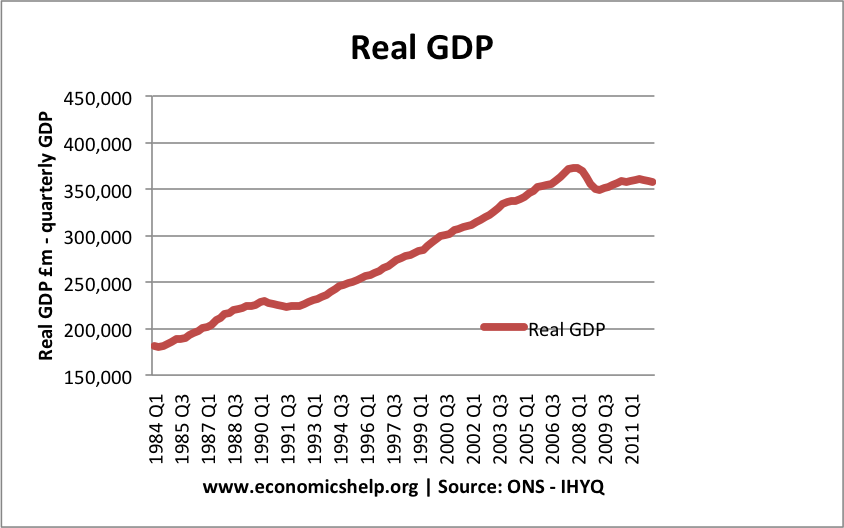Readers Question: why does economic growth not get noticed by the man on the street?
- Recently, the ONS released a report saying that real wages were 62% higher than in 1986. This is the result of sustained economic growth. (Real wages take into account inflation.)
- In April 2011 the average full-time employee in the UK earned around £12.62 per hour excluding overtime.
- This is a monetary (nominal) increase of 226% since 1986 when the average wage was £3.87 per hour.
Inequality of Real Income growth
- The top 1 per cent had the biggest increase between 1986 and 2011, at 117%
- The top 10 per cent saw an increase of 81%
- The bottom 10 per cent had a 47 % increase.
- The very poorest did better, with the lowest 1 per cent having a 70% increase.
However, in the period 2007-11, all income groups have seen a fall in real wages as nominal wage growth has failed to keep up with inflation.

If we asked people do they feel better off than 1986, it is hard to know what people would say. I’m sure some would feel better off, but many may reply they don’t. Why don’t people notice economic growth? Some possible reasons:
- Economic Growth and living standards. Economic growth measures the increase in real GDP (real output, real incomes). However, GDP is often a poor reflection of living standards and peoples sense of well being. For example, despite rising real incomes, people may not feel as well off. This could be because:
- Quality of life diminished by pollution or increased congestion
- Increased fear of crime that may occur with economic growth. (Ironically, with more income, people have more to lose. Crime rates are higher in the UK, than in the 1930s – a period of greater poverty)
- see also: difficulty in measuring living standards
- Economic growth fails to meet expectations. People may expect to see increase in real incomes, and notice it more when incomes fail to keep up with economic growth. For example, in the 1980s there were no mobile phones or laptops to buy. Now we feel, if we don’t have technological gadgetry, we are missing out. Another example of expectations could be with personal transport. In the 1960s, car ownership was much rarer. People didn’t have the costs of buying and running a car. However, by 2010, running a car is seen as a necessity, yet we struggle to meet the additional costs this entails.
- Real income growth is less important than we might expect. For example, despite real income growth, life can still feel a struggle. Unemployment is higher now than in 1986. Therefore, although we have higher incomes, the fear of being made unemployed is greater now than in the 1960s. This fear of unemployment may be much more important than the increase in real incomes.
- Diminishing marginal returns to extra income. Does an increase in income make us happier? Arguably, there is a diminishing marginal utility of money. The first car brings happiness, but the bigger or second car does very little to increase welfare. Therefore, as real incomes increase, our sense of satisfaction increases at a much slower rate.
- Relative income. A big issue is that people often measure welfare by their relative position in society. For example, in Victorian England, someone on an income of £400 a year may have felt he was doing very well – because he had much more than everyone else. In the UK, if you’re earning only £10,000 a year you might look enviously at the 90% of the population who have a higher income. Economic growth cannot alter the fact some people will always feel relatively worse off than everyone else. In fact economic growth can increase inequality and a feeling of missing out.
- Cost of living. Real GDP measures the increase in income – inflation. But, inflation excludes some factors like house prices. In 1986, it was much easier to get on the property ladder than it is now. Real house prices were still affordable. Economic growth has ironically made it harder to buy a house. Many young people can’t afford to buy a house, which is a very important indicator of economic welfare. So people may feel worse off today than in the 60s, 70s or 80s.
Any other suggestions why people may not notice economic growth?
Do you feel better off now than 10 or 20 years ago?
Related

Posters tend to like comparing their own operations (lifestyle) with those stated by others.